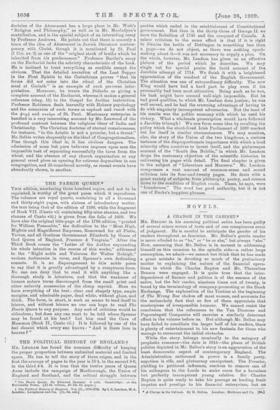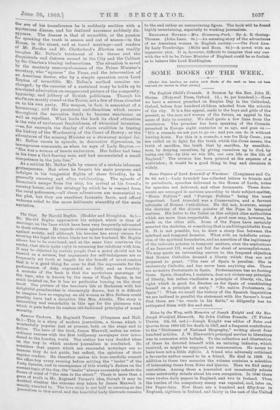NOVELS.
A CHANGE IN THE CABINET.* BELLOC in his amusing political satire has been guilty of several minor errors of taste and of one conspicuous error of judgment. He is careful to anticipate the gender of his readers throughout as feminine. Mr. Belloc's gentle reader is never alluded to as "be," or " he or she," but always "she." Now, assuming that Mr. Belloc is in earnest in addressing himself on this occasion to the spindle side—a rather large assumption, we admit—we cannot but think that he hi►s made a great mistake in devoting so much of the preliminary matter to explaining the nature of the financial opera- tions in which Sir Charles Repton and Mr. Theocritus Benson were engaged. It is quite true that the inter- dependence of finance and politics is of the essence of the satire, but the fair reader, nineteen times out of twenty, is bored by the terminology of company-promoting or the Stock Exchange. The explanation of the Tontine at the beginning of The Wrong Box chokes off most women, and accounts for the melancholy fact that so few of them appreciate that masterpiece of irresponsible humour. We cannot resist the conclusion that the references to the Van Diemens and Popocatapetl Companies will exercise a similarly deterrent effect in the volume before us. But although Mr. Belloc may have failed to conciliate the larger half of his readers, there is plenty of entertainment in his new fantasia for those who manage to surmount the initial obstacles.
While the story belongs nominally to the eategmy of prophetic romance—the date is 1915—the phase of British politics depicted iu Mr. Belloc's story is an aggravation of the least democratic aspect of contemporary England. The Administration enthroned in power is a family party, nepotism is rife, and plutocracy omnipotent. The Premier, yielding to petticoat influence, resolves to remove one of his colleagues to the Lords to make room for a harmless but perfectly incompetent young relative. Sir Charles Reptou is quite ready to take his peerage as lending fresh impetus and prestige to his financial enterprises, but on
• d Change in the Cabinet. By II. Beiloo. London Methuen and Co. Rita the eve of his transference he is suddenly smitten with a InYeterious disease, and his destined successor suddenly die- appears. The disease is that of veracititis, or the passion for speaking the truth in season and out of season—in the Rouse, in the street, and at board meetings—and readers of Me. Burden and Mee Clutterbucle's Election can readily imagine Mr. Betimes treatment of hie theme and the disquietude and distress caused in the City and the Cabinet by Sir Charles's blazing indiscretions. The situation is saved by the masterly unscrupulousness of the Prime Minister's secretary, who " squares " the Press, and the intervention of an American doctor. who by a simple operation cures Lord Repton of veracititis. Mr. Belloc's method remains un- changed: by the exercise of a sustained irony be holds up to simulated admiration an exaggerated picture of the pomposity. hypocrisy, and jobbery of British politicians. Though his shafts are mostly aimed at the Tories, not a few of them ricochet on to his own party. His weapon, in fact, is somewhat of a boomerang ; and the persistent anti-Semitism which recurs throughout the narrative tends to become wearisome as well as repellent. What lends the book its chief attraction is the vein of exuberant freakishness, of whimsical invention, "'as, for example, the display of sham erudition in tracing the history of the Wardeneliip of the Court of Dowry ; or the adventures of the missing Minister as a stowaway malgre lui. ?tie Bailee excels in episode, in decorative digressions, in incongruous comments, as when he says of Lady Repton !She was a woman of heroic endurance. Her father had been in his time a God-fearing man, and had accumulated a small competence in the jute Elie
As a Blithest Mr. Belloc fails by reason of a certain inhuman geeteseienese. But when lie forgets his main purpose, and indulges in his tangential flights of sheer frivolity, he is generally amusing and often exhilarating. The episode of Demolue's escape from the ship, his arrival at his friend's country house, and the strategy by which he is rescued from the rural policemen,—all these adventures are unessential to the plot, but they are excellent fantastic farce, and afford welcome relief to the more deliberate absurdity of the main narrative.



























































 Previous page
Previous page